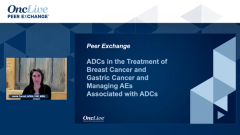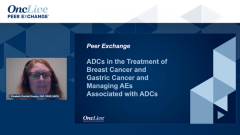
Patient Profile 3: A Patient with HER2+ Gastric Cancer Treated With T-DXd–who Develops Neutropenia
Centering discussion on a patient profile of HER2+ gastric cancer, experts in oncology discuss the occurrence of neutropenia with trastuzumab deruxtecan therapy.
Episodes in this series

Transcript:
Sarah Donahue, MPH, NP, AOCNP: We’re going to move on to our second module on the treatment of HER2 [human epidermal growth factor receptor 2]–positive gastric cancer. Theresa will present our third case.
Theresa Wicklin Gillespie, PhD, MA, RN, FAAN: Thank you. This is the third case. This is a 70-year-old White female. Her presenting symptoms are some not-very-profound nausea and diarrhea. However, she did have an unexplained weight loss of 13 pounds. Interestingly, she had no family history of other GI [gastrointestinal] cancers. She’s never smoked. She didn’t have any dietary risk factors such as consuming a lot of smoked or preserved meats, which are often associated with gastric cancer. And she had no other comorbidities except for osteoporosis, and she had been treated for that. With her symptoms, her primary care provider referred her to a gastroenterologist, and she had a colonoscopy that was negative, and then she had an EGD [esophagogastroduodenoscopy] that did show a gastric lesion. She was further worked up, including a biopsy that showed gastric adenocarcinoma.
She was then referred to an oncologist who recommended systemic therapy with fluorouracil, leucovorin, oxaliplatin, and docetaxel, which is considered category 1 evidence. She got 4 cycles of neoadjuvant and 4 cycles of adjuvant chemotherapy and tolerated her systemic therapy quite well. She had surgery in between, including a subtotal gastrectomy with lipoma appendectomy. On pathology, her tumor was classified as T3 [triiodothyronine] and 0N1, which is a stage IIA. The margins were clear, and she did have HER2 [human epidermal growth factor receptor 2] overexpression. The patient, needless to say, was quite excited. She thought everything was taken care of, and the next steps were to be followed regularly by her oncologist and her surgeon.
However, 14 months after her surgery, she began to experience some shortness of breath. She had a diagnostic work-up and a biopsy, which showed metastatic disease in her left lung. She had some other testing. Based on all these findings, she was started on a trastuzumab-pembrolizumab regimen that was given every 3 weeks. She tolerated that chemotherapy well. However, after 2 cycles, her lung disease showed progression. At that point, she was referred to an NCI [National Cancer Institute] for consideration of further treatment.
There was considerable discussion about treatment options, as well as a thorough assessment of the patient: her comorbidities, previous therapies, etc. But her performance status was excellent. She was doing very well, so she elected to begin second-line treatment with T-DXd [trastuzumab deruxtecan] at 6.4 mg/kg every 3 weeks. She had a CVC [central venous catheter] that was repeated prior to each dose.
Unfortunately, she developed neutropenia, which is not uncommon. In fact, myelosuppression is 1 of the most common toxicities reported with this drug. She did have grade 3 neutropenia, as well as an elevated temperature, so the treatment was stopped and she was assessed for other signs and sources of infection, including ILD [interstitial lung disease] and pneumonitis. However, those findings were negative. She was started on antibiotics in the clinic and evaluated for outpatient treatment. Her status was confirmed to be low risk, so she was discharged home with her family members and scheduled for follow-up care. Her fever also resolved very quickly, and there was no evidence or documentation of infection.
We continued to monitor her, and after 3 weeks of follow-up, her ANC [absolute neutrophil count] recovered to grade 0 status. Then we restarted her drug at a 1-dose reduction, so she went from 6.4 to 5.4 mg/kg. The plan was to maintain this dose level for her next cycles, unless she required a subsequent dose reduction or if her disease progressed further. At that time, we would need to think about other options.
Since that point, she’s continued to tolerate her current regimen, and she’s had a very good, marked response to treatment with the drug. In terms of tolerating the therapy, she’s done quite well, considering everything she’s been through.
Transcript edited for clarity.











































